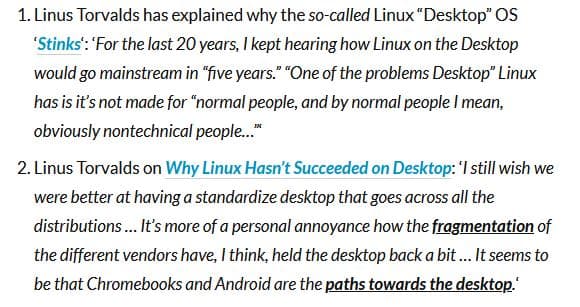(8/06/2021 – Some links had expired and were removed for this transfer)
Anyone who has ever visited a Linux Forum probably understands what the word Gobbledygook means.

Those Forums seem filled wid what Linus Torvalds calls “normal people” – ‘“One of the problems Desktop” Linux has is it’s not made for “normal people, and by normal people I mean, obviously nontechnical people…”’
Linux Forums are basically for “normal people” who ignore Linus Torvalds’ advice. For the most part, those Forms seem to be run by rude “normal people” pretending to be ‘Technical’ people. There are exceptions, e.g. the EndeavourOS Forum is one of the best Linux Forms I have seen.
Other than checking out what a Distro’s problems are – during my tests – I avoid those forums. If I personally need an answer for one of my Permanent Linux OSes, a simple Google search often solves the problem. Without a doubt, Ubuntu is the most popular Distro, and during any Google search that fact becomes obvious, i.e. Ubuntu always has answers listed in those searches.
Lack of “fails well” ‘n Fail-safe in Linux Kernel
Linux Kernel Security Done Right
To borrow from an excellent analogy between the modern computer ecosystem and the US automotive industry of the 1960s, the Linux kernel runs well: when driving down the highway, you’re not sprayed in the face with oil and gasoline, and you quickly get where you want to go. However, in the face of failure, the car may end up on fire, flying off a cliff.
- From that quote we get: Giant bags of mostly water – Securing your IT infrastructure by securing your team.
continued…
As we approach its 30th Anniversary, Linux still remains the largest collaborative development project in the history of computing. The huge community surrounding Linux allows it to do amazing things and run smoothly. What’s still missing, though, is sufficient focus to make sure that Linux fails well too. There’s a strong link between code robustness and security: making it harder for any bugs to manifest makes it harder for security flaws to manifest. But that’s not the end of the story. When flaws do manifest, it’s important to handle them effectively.
- From that quote we get Wikipedia’s: Fail-safe – In engineering, a fail-safe is a design feature or practice that in the event of a specific type of failure, inherently responds in a way that will cause minimal or no harm to other equipment, to the environment or to people.
continued…
Long-term Linux robustness depends on developers, but especially on effective kernel maintainers. Although there is effort in the industry to train new developers, this has been traditionally justified only by the “feature driven” jobs they can get. But focusing only on product timelines ultimately leads Linux into the Tragedy of the Commons. Expanding the number of maintainers can avoid it. Luckily the “pipeline” for new maintainers is straightforward.
Maintainers are built not only from their depth of knowledge of a subsystem’s technology, but also from their experience with mentorship of other developers and code review. Training new reviewers must become the norm, motivated by making upstream review part of the job. Today’s reviewers become tomorrow’s maintainers. If each major kernel subsystem gained four more dedicated maintainers, we could double productivity.
- From that quote we get: Tragedy of the commons – In economic science, the tragedy of the commons is a situation in which individual users, who have open access to a resource unhampered by shared social structures or formal rules that govern access and use, act independently according to their own self-interest and, contrary to the common good of all users, cause depletion of the resource through their uncoordinated action.
For the most part, those first two linked-articles are by very knowledgeable ‘Technical People’, e.g. Kees Cook, Software Engineer, Google Open Source Security Team. Still, even for a “normal people” like me, there is enough ‘understandable’ information in those articles that suggest the Linux Kernel needs help heading into the future.
The Linux Kernel Security Done Right article is an excellent ‘n extremely informative blog post from the Google Security Blog. It sums up thusly:
Don’t wait another minute
If you’re not using the latest kernel, you don’t have the most recently added security defenses (including bug fixes). In the face of newly discovered flaws, this leaves systems less secure than they could have been. Even when mediated by careful system design, proper threat modeling, and other standard security practices, the magnitude of risk grows quickly over time, leaving vendors to do the calculus of determining how old a kernel they can tolerate exposing users to. Unless the answer is “just abandon our users,” engineering resources must be focused upstream on closing the gap by continuously deploying the latest kernel release.
Based on our most conservative estimates, the Linux kernel and its toolchains are currently underinvested by at least 100 engineers, so it’s up to everyone to bring their developer talent together upstream. This is the only solution that will ensure a balance of security at reasonable long-term cost.
More suggestions ‘n reasons as to why “Desktop” Linux has never been popular, and the future of “Desktop” Linux seems even bleaker, IMHO.

Chromebooks
Looks like the PC Market continues to grow, and even wid a slow down Chromebooks showed a “75% annual growth” in Q2 this year – that slow down is from a roughly 340% growth rate high late last year.

Chromebook vendors have doubled down on investments in the product category and most have continued to see strong returns in terms of growth. HP maintained pole position with shipments of 4.3 million units and growth of 116% in Q2. Lenovo took second place with 2.6 million units shipped increasing shipments by 82% from a year ago. Acer secured a top-three position with growth of 83.0% propelling it above 1.8 million units in shipments. Dell and Samsung made up the remainder of the top five, with the former being the only leading vendor to suffer a shipment decline.
This is something else that most “Desktop” Linux normal users don’t understand, i.e. Investing. They know little or nothing about Desktop OSes, and know even less about what Investing involves. I follow a lot of blogs ran by “Desktop” Linux normal users, and a common belief amongst them is that “Desktop” Linux would be as popular as Windows 10 *IF* PC OEM’s would just invest in ‘n build more Linux computers.
“Desktop” Linux has been an OS joke for 30 years, and I see nothing that is going to change that. Invest your own money in it!?!?!?!?! You have to be kidding … 🙄
Meanwhile, for just the past 10 years, Chromebook vendors have been steadily investing their money in building more Chromebooks, and their reward/s for that wise Investing are continued “strong returns.”
Special *PURPOSE* Linuxes
“Desktop” Linux OS is mainly for Technical people like Developers, Programmers, IT Specialists, Software Engineers, Linux Kernel Maintainers, etc. Exceptions would be for Special *PURPOSE* Linuxes.
As I bring this post to an end, I want to add another Special *PURPOSE* Linuxes to my growing list, for potential Windows 10 & Windows 11 users to check out, but also for Chromebook’s Chrome OS users this time. As mentioned earlier in this post, Chromebooks have seen an incredible growth rate over this past year.
Say what you will about Google, but there is no denying their ability to build Desktop/Laptop/Mobile Operating Systems (OSes) that “normal people” love! Here’s one they have recently purchased, and are now working on…for ‘sOmE’ reason/s: CloudReady OS Linux – What’s the best CloudReady device? The one you already have.
Chromebook’s Chrome OS has an Auto Update Expiration (AUE) date when updates end, and CloudReady OS Linux can be installed on them when that AUE date arrives.
CloudReady OS Linux is based on Google’s Chromium OS, and was built by Neverware. It can be installed on old PC computers, new PC computers, and expiring Chromebooks. Stable, secure, reliable, and extremely user friendly. Oh, and it apparently never expires.
Will add this post to the Special *PURPOSE* Linuxes page.
LINUX IS LIKE A BOX OF CHOCOLATES – you never know what you’re gonna get!
